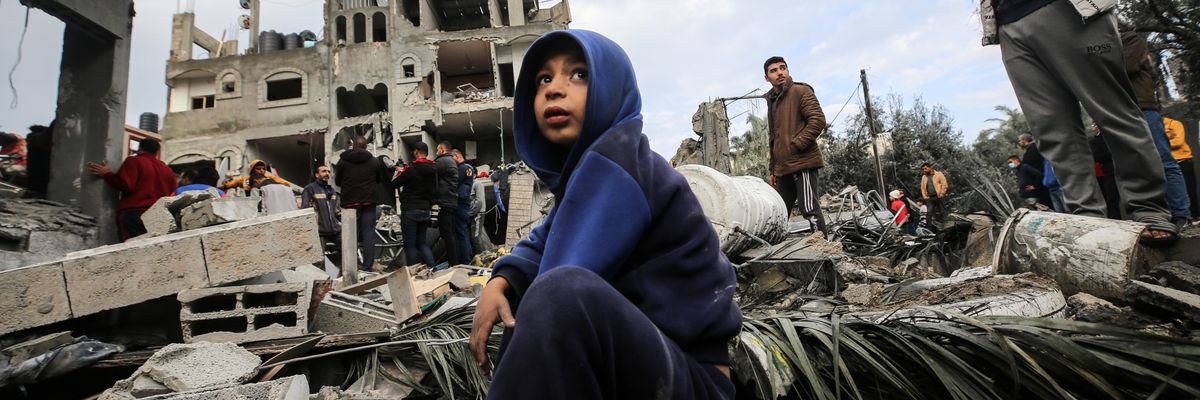Israeli Prime Minister Benjamin Netanyahu said Monday that his nation's forces will be expanding their assault on the Gaza Strip in the coming days after the U.S. weakened a United Nations Security Council resolution that originally aimed to pursue a stop to the fighting.
Over just the past 24 hours, the Israeli military—armed to the teeth by the U.S.—has killed more than 250 people in the besieged Palestinian territory, flattening residential buildings and wiping out entire families. In central Gaza, Israeli forces bombed a refugee camp on Sunday, killing more than 100 people.
"Survivors at the Maghazi refugee camp dug through the debris with their bare hands, searching desperately for all that they have lost," PBS correspondent William Brangham reported. "On Friday, they were told by the Israeli military to move here. And now it is the site of death and devastation."
The intensified assault came as Netanyahu visited the Gaza Strip for the second time since October 7, when a Hamas-led attack on southern Israel killed more than 1,000 people.
"We're not stopping, we are continuing to fight, and are deepening the fighting in the coming days," the deeply unpopular Israeli prime minister said in a statement Monday. "This will be a long battle, and it is not close to ending."
Louis Charbonneau, U.N. director at Human Rights Watch, observed in response to Netanyahu's remarks that "thanks to the U.S. watering down the U.N. Security Council resolution adopted Friday, Israel's leaders apparently feel no pressure to stop attacking civilians in Gaza."
"Diplomatic cover + U.S. arms transfers risk complicity in Israeli laws-of-war violations," Charbonneau wrote on social media.
Last week, the U.S. repeatedly forced the U.N. Security Council (UNSC) to delay votes on a resolution that initially called for an "urgent and sustainable cessation of hostilities." Other Security Council members ultimately agreed to U.S.-backed language changes, given the threat of another veto.
With the U.S. abstaining from the final vote, the binding resolution passed Friday afternoon—but rights groups warned the measure's call for an expansion of humanitarian aid would likely be rendered meaningless by the failure to secure a cease-fire.
"[U.S. President Joe] Biden threatened to veto the UNSC resolution unless the call for an end to hostilities was deleted," Trita Parsi, executive vice president of the Quincy Institute for Responsible Statecraft, wrote late Monday. "The other states struck that demand to appease Biden, and... voila: Israel intensifies its bombing of Gaza with more children killed."
"This is on Biden," he added.
Israeli forces have killed more than 20,000 people since early October and displaced most of Gaza's population, heightening fears that the goal of what's been called one of the most devastating bombing campaigns in recent history is to permanently remove the Palestinian population.
A U.N. humanitarian leader told Reuters on Monday that "there's so little space left here in [the southern Gaza city of] Rafah that people just don't know where they will go and it really feels like people being moved around a human chessboard because there's an evacuation order somewhere." According to a New York Times investigation, Israel has repeatedly used 2,000-pound bombs in southern Gaza, the region to which the Israeli military instructed people to flee.
Jan Egeland, secretary-general of the Norwegian Refugee Council, said in a statement Tuesday that "the forcible transfer and deportation of a significant population across borders, lacking any guarantees of return, would constitute a serious breach of international law, amounting to an atrocity crime."
"Pushing for the irreversible deportation of hundreds of thousands directly undermines resolving this conflict amid decades of a refugee crisis," said Egeland. "The international community must unequivocally condemn any forced displacement of Palestinians, whether within or outside the Gaza Strip."




